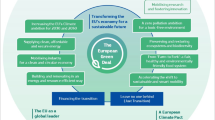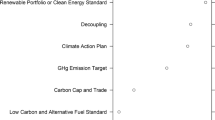Abstract
This article introduces the implementation of the Framework Convention on Climate Change in a non-Party state: Taiwan. It examines the reasons why Taiwan as a non-Party decided to voluntarily comply with the FCCC. The institutional and legal settings for an effective implementation, as well as the implementation strategies put forward by the Taiwanese academics and manifested by the government will be discussed. Critique of the implementation strategies pursued by the government, and external and domestic obstacles for an effective implementation will be investigated as well.
Similar content being viewed by others
References
Attix, C. (1995), 'Between the Devil and the Deep Blue Sea: Are Taiwan's Trading Partners Implying Recognition of Taiwanese Statehood?', California Western International Law Journal 25(2), 357.
Bodansky, D. M. (1993), 'The UNFCCC: A Commentary', Yale Journal of International Law 18, 451.
Bodansky, D. M. (1995), 'The Emerging Climate Change Regime', Annual Review of Energy and Environment 20, 425.
Brack, D. et al. (2000), International Trade and Climate Change Policies, London: Earthscan.
Burns, W. C. (1996), 'The Second Session of the Conference of the Parties to the United Nations Framework Convention on Climate Change: More Heat Than Light?', 1996 Yearbook: Colorado Journal of International Environmental Law & Policy, 153–162.
Chang, Y. J. (1995), 'In Pursuit of a Sustainable Energy Policies', Taiwan Economic Research Monthly 18 (7), 101–110 (Mandarin).
Chow, Daniel C. K. (1995), 'Recognising the Environmental Costs of the Recognition Problem: The Advantages of Taiwan's Direct Participation in International Environmental Law Treaties', Stanford Environmental Law Journal 14(2), 256.
Crawford, J. (1979), The Creation of States in International Law, Oxford: Clarendon Press.
Egenhofer, C. and J. Cornillie (23 March 2001), Reinventing the Climate Negotiations: An Analysis of COP6, CEPS Policy Brief No. 1, full text can be downloaded from: http://www.ceps.be/Pubs/2001/Post-COP6.PDF.
Energy Commission, Ministry of Economic Affairs (1998), Yearbook of Taiwan's Energy Statistics, Taipei: Energy Commission, MoEA. (Mandarin)
EPA (1997), The Evaluation of the Impact of FCCC on Taiwan and the Analysis of the Strategies Adopted, Taipei: EPA. (Mandarin)
EPA (October 2000), UNFCCC National Communication of the Republic of China 1999, Taipei: EPA, full text can be downloaded from: http://sd.erl.itri.org.tw/fccc/ (Mandarin).
Feeley, M. S. (November/December 1990), 'Reclaiming the Beautiful Island: Taiwan's Emerging Environmental Regulation', San Diego Law Review 27, 907.
GCC, EPA, & Association of Earth Science (May 1996), A Preliminary Integrated Seminar on the Evaluation of the Reduction of GHGs and its Impact on Taiwan, Taipei: GCC of the NTU (Mandarin).
Huang, J. I. and L. G. Fang (1993), 'Framework Convention on Climate Change, the Positions of its Members, and the Strategic Considerations for Taiwan's Response', The Energy Quarterly 23(3), 130 (Mandarin).
Huang, J. I., R. T. Young and L. G. Fang (1994), 'Discussion on under which Category shall Taiwan Belong in the FCCC', Energy, Resource, Environment Quarterly 7(1), 45 (Mandarin).
Liu, C. M. (August 1994), 'The Analysis of 'Global Change Research' and the Difficulties Facing the Domestic Researchers', Newsletter of the Global Change Centre 1, 15–17 (Mandarin).
Liu, C. M. et al. (March 1996), Greenhouse Gas Emission and Uptake in Taiwan, Bangkok: START/SARCS/APN Global Change Science and Policy Forum.
Liu, C. M. et al. (April 1996), The Proposed National Communication to the FCCC (a research project financed by the EPA of the Executive Yuan), Taipei: GCC of the NTU (Mandarin).
Liu, C. M. et al. (May 1996), The Overview of the Reduction Strategies of the GHGs Emission, Taipei: GCC of the NTU, EPA, and the ROC's Association of Global Science (Mandarin).
Liu, C. M. et al. (eds.) (June 1996), The Mechanism and Prediction of the Green-house Effect: An Inter-disciplinary Research Project in Response to the FCCC, Taipei: GCC of the NTU (an EPA project executed by the GCC of the NTU) (Mandarin).
Mendelsohn, R. (1996), 'The Impact of Global Warming on Pacific Rim Countries', in: R. Mendelson and D. Shaw (eds.), The Economics of Pollution Control in the Asian Pacific, Brookfield, VT: Edward Elgar Publishing.
Mintzer, I. M. and J. A. Leonard (eds.) (1994), Negotiating Climate Change: The Inside Story of the Rio Convention, Cambridge: Cambridge University Press.
Missfeldt, F. (1998), 'Flexibility Mechanisms: Which Path to Take after Kyoto?', Review of European Community & International Environmental Law 7(2), 128–139.
NCSD (19 January 1998), NCSD: Second Council Meeting Agenda, Taipei: NCSD. (Mandarin)
Pinkham, M. M. (1991), 'The Montreal Protocol: An Effort to Protect the Ozone', Suffolk Transnational Law Journal 15, 255.
Qin, Y. (Spring 1992), 'GATT Membership for Taiwan: An Analysis in International Law', New York University Journal of international Law & Politics 24, 1059.
Rowlands, I. H. (1995), 'The Climate Change Negotiations: Berlin and Beyond', Journal of Environment & Development 4(2), 145–164.
Sands, P., R. G. Tarasofsky and M. Weiss (eds.) (1994), Documents in International Environmental Law, Volume IIA, Manchester and New York: Manchester University Press.
Sands, P. (1995), Principles of International Environmental Law, Volume I: Frameworks, Standards and Implementation, Manchester and New York: Manchester University Press.
Shih, W. C. (June 1996), 'Multilateralism and the case of Taiwan in the Trade Environment Nexus – the Potential Conflict between CITES and GATT/WTO', Journal of World Trade 30(3), 109.
Shih, W. C. (June 1998), 'Multilateral Environmental Agreements and Taiwan', Asia Pacific Journal on Environment and Development 5(1).
Tang, D. C. (October 1993), 'The Environmental Laws and Policies of Taiwan: A Comparative Law Perspective', Vanderbilt Journal of Transnational Law 26, 521.
Tang, D. C. (1997), 'New Development in Environmental Law and Policy in Taiwan', Pacific Rim Law & Policy 6(2), 245.
Yamin, F. (1998), 'The Kyoto Protocol: Origins, Assessment and Future Challenges', Review of European Community & International Environmental Law 7(2), 113–127.
Yeh, J. R. (April 1995), The Normalization of the Global Climate Change and its Impact on the Policy-making Mechanism and Legal System in Taiwan, Taipei, from the essay collections of the Seminar on the Institutional and Social Impact of the Global Climate Change jointly held by the GCC and EPA (Mandarin).
Yeh, J. R. (Spring 1996), 'Institutional Capacity-building Toward Sustainable Development: Taiwan's Environmental Protection in the Climate of Economic Development and Political Liberalisation', Duke Journal of Comparative & International Law 6, 229.
Young, R. T. (April 1995), FCCC COP1: the Analysis and its Impact upon Taiwan, Hsinchu (Taiwan): ITRI (Mandarin).
Young, R. T. and L. G. Fang (July 1995), The Statistics of the Anthropogenic GHGs in Taiwan: Energy Sector – A Report of the Foundation of Energy Research Development, Taipei: Energy Committee, Ministry of Economics (Mandarin).
Author information
Authors and Affiliations
Rights and permissions
About this article
Cite this article
Shih, WC. The Implementation of the UN Framework Convention on Climate Change in a Non-Party State: Taiwan. International Environmental Agreements: Politics, Law and Economics 2, 69–98 (2002). https://doi.org/10.1023/A:1015041414440
Issue Date:
DOI: https://doi.org/10.1023/A:1015041414440




